Related Research Articles

Day of the Tentacle, also known as Maniac Mansion II: Day of the Tentacle, is a 1993 graphic adventure game developed and published by LucasArts. It is the sequel to the 1987 game Maniac Mansion. The plot follows Bernard Bernoulli and his friends Hoagie and Laverne as they attempt to stop the evil Purple Tentacle - a sentient, disembodied tentacle - from taking over the world. The player takes control of the trio and solves puzzles while using time travel to explore different periods of history.

Lucasfilm Games is an American video game licensor and a subsidiary of Lucasfilm. It was founded in May 1982 by George Lucas as a video game development group alongside his film company; as part of a larger 1990 reorganization of the Lucasfilm divisions, the video game development division was grouped and rebranded as part of LucasArts. LucasArts became known for its line of adventure games based on its SCUMM engine in the 1990s, including Maniac Mansion, the Monkey Island series, and several Indiana Jones titles. A number of influential game developers were alumni of LucasArts from this period, including Brian Moriarty, Tim Schafer, Ron Gilbert, and Dave Grossman. Later, as Lucasfilm regained control over its licensing over the Star Wars franchise, LucasArts produced numerous action-based Star Wars titles in the late 1990s and early 2000s, while dropping adventure game development due to waning interest in the genre.

Monkey Island is a series of adventure games. The first four games were produced and published by LucasArts, earlier known as Lucasfilm Games. The fifth was developed by Telltale Games with LucasArts, while the sixth was developed by Terrible Toybox with Lucasfilm Games and Devolver Digital.

Script Creation Utility for Maniac Mansion (SCUMM) is a video game engine developed at Lucasfilm Games, later renamed LucasArts, to ease development on their graphic adventure game Maniac Mansion (1987). It was subsequently used as the engine for later LucasArts adventure games and Humongous Entertainment games.
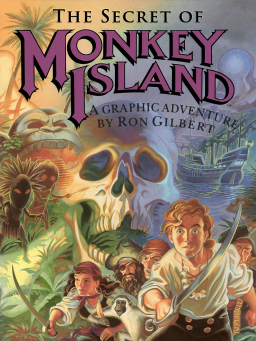
The Secret of Monkey Island is a 1990 point-and-click graphic adventure game developed and published by Lucasfilm Games. It takes place in a fictional version of the Caribbean during the age of piracy. The player assumes the role of Guybrush Threepwood, a young man who dreams of becoming a pirate, and explores fictional islands while solving puzzles.
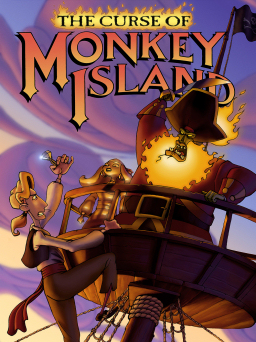
The Curse of Monkey Island is an adventure game developed and published by LucasArts in 1997. A sequel to 1991's Monkey Island 2: LeChuck's Revenge, it is the third game in the Monkey Island series.

Script Creation Utility for Maniac Mansion Virtual Machine (ScummVM) is a set of game engine recreations. Originally designed to play LucasArts adventure games that use the SCUMM system, it also supports a variety of non-SCUMM games by companies like Revolution Software and Adventure Soft. It was originally written by Ludvig Strigeus. ScummVM is free software that is released under the terms of the GNU General Public License.
Michael Z. Land is an American video game composer and musician best known for his scores for various games produced by LucasArts.

Monkey Island 2: LeChuck's Revenge is an adventure game developed and published by LucasArts in 1991. Players control the pirate Guybrush Threepwood, who searches for the legendary treasure of Big Whoop and faces the zombie pirate LeChuck.
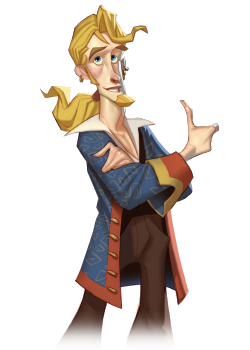
Guybrush Ulysses Threepwood is a fictional character who serves as the main protagonist of the Monkey Island series of computer adventure games by LucasArts. He is a pirate who adventures throughout the Caribbean in search of fame and treasure alongside his love interest and later wife, Elaine Marley, often thwarting the plans of the undead pirate LeChuck in the process. Though a "mighty pirate" by his own account, he is a rather clumsy and disorganized protagonist throughout the series. It is a running joke throughout the games for characters to garble Guybrush Threepwood's unusual name, either deliberately or accidentally. In all voiced appearances, Guybrush has been portrayed by actor Dominic Armato.

Escape from Monkey Island is an adventure game developed and released by LucasArts in 2000. It is the fourth game in the Monkey Island series, and the sequel to the 1997 videogame The Curse of Monkey Island. It is the first game in the series to use 3D graphics and the second game to use the GrimE engine, which was upgraded from its first use in Grim Fandango.

From the late 1980s to the early 2000s, LucasArts was well known for their point-and-click graphic adventure games, nearly all of which received high scoring reviews at the time of their release. Their style tended towards the humorous, often irreverent or slapstick humor, with the exceptions of Loom and The Dig. Their game design philosophy was that the player should never die or reach a complete dead-end, although there were exceptions.

Ron Gilbert is an American video-game designer, programmer, and producer. His games are generally focused on interactive story-telling, and he is arguably best known for his work on several LucasArts adventure games, including Maniac Mansion and the first two Monkey Island games. In 2009, he was chosen by IGN as one of the top 100 game creators of all time.
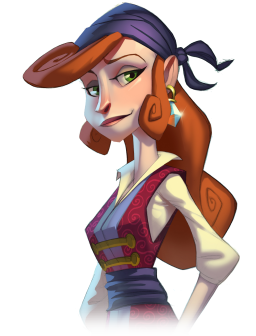
Elaine Marley is a character in the Monkey Island series of graphic adventure video games. Created by Ron Gilbert for LucasArts, the character first appears in The Secret of Monkey Island and is one of the core characters in the franchise. Originally conceived as a ruthless island governor, the character evolved during development into the protagonist's love interest. While the first two games in the series did not feature voice acting, Elaine was voiced by Alexandra Boyd in The Curse of Monkey Island and by Charity James in Escape from Monkey Island; Boyd would reprise the role for later entries in the franchise.

Peter Nelson McConnell, also known as Peter Mc, is an American video game composer and musician, best known for his work at LucasArts and for composing the soundtracks for every Sly Cooper game since the second installment.
Clint Bajakian is an American video game composer and musician.
In video games, adaptive music is background music whose volume, rhythm or tune changes in response to specific events in the game.
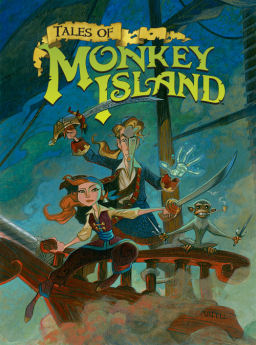
Tales of Monkey Island is a 2009 graphic adventure video game developed by Telltale Games under license from LucasArts. It is the fifth game in the Monkey Island series, released nearly a decade after the previous installment, Escape from Monkey Island. Developed for Windows and the Wii console, the game was released in five episodic segments, between July and December 2009. In contrast to Telltale's previous episodic adventure games, whose chapters told discrete stories, each chapter of Tales of Monkey Island is part of an ongoing narrative. The game was digitally distributed through WiiWare and Telltale's own website, and later through Steam and Amazon.com. Ports for OS X, the PlayStation Network, and iOS were released several months after the series ended.

The International House of Mojo is a website focused on LucasArts video games. It later expanded to cover studios founded by former LucasArts employees, including Double Fine Productions, Telltale Games, Autumn Moon Entertainment and Crackpot Entertainment. It was founded in 1997 by James Spafford and is among the longest-running "fan sites" on the internet.
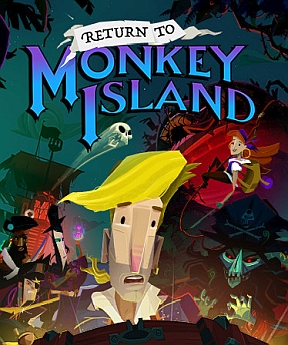
Return to Monkey Island is a point-and-click adventure game developed by Terrible Toybox and published by Devolver Digital. The sixth Monkey Island game, it was released for macOS, Nintendo Switch, and Windows on September 19, 2022, for Linux on October 26, 2022, for PlayStation 5 and Xbox Series X/S on November 8, 2022, and for iOS and Android on July 27, 2023. It was the first Monkey Island game by the series' creator, Ron Gilbert, since Monkey Island 2: LeChuck's Revenge (1991).
References
- 1 2 "iMUSE and the Secret of Organic Music". 1UP.com. 2012-06-26. Archived from the original on 2013-01-24. Retrieved 2013-08-28.
- 1 2 Sweet, Michael (October 2, 2014). Writing Interactive Music for Video Games: A Composer's Guide. Addison-Wesley Professional. p. 99. ISBN 978-0321961587.
Frustrated with the state of music in games at the time, two composers at LucasArts Peter McConnell and Michal Land created one of the first adaptive music systems, called iMuse. iMuse (Interactive MUsic Streaming Engine) let composers insert branch and loop markers into a sequence that would allow the music to change based on the decisions of the player. The iMuse engine was one of the first significant contributions to interactive music for video games. Its importance in shaping many of the techniques that you see in video games today cannot be overemphasized. (...)
- ↑ USpatent 5315057,LAND MICHAEL Z [US]; MCCONNELL PETER N [US],"Method and apparatus for dynamically composing music and sound effects using a computer entertainment system", assigned to LUCASARTS ENTERTAINMENT CO [US]
- ↑ "SCUMM Versions". ScummVM. 2005-04-10. Retrieved 2013-08-28.
- ↑ "LucasArts' Secret History: Monkey Island 2: LeChuck's Revenge - The Music of LeChuck's Revenge". The International House of Mojo. 2008-08-04. Retrieved 2013-08-28.
- ↑ Mackey, Bob (March 7, 2016). "Day of the Tentacle Composer Peter McConnell on Communicating Cartooniness". USgamer . Retrieved March 7, 2016.
- ↑ "Jesse Harlin and Wilbert Roget Interview". The International House of Mojo. 2011-03-04. Retrieved 2013-08-28.
- ↑ "LucasArts' Secret History: Monkey Island 2: LeChuck's Revenge - Trivia". The International House of Mojo. 2008-08-04. Retrieved 2013-08-28.
- ↑ "Star Wars: TIE Fighter demo (MS-DOS)". The International House of Mojo. 2010-09-13. Retrieved 2013-08-28.
- ↑ "Monkey Island 2: LeChuck's Revenge - Special Edition Review". Adventure Gamers. 2010-07-23. Retrieved 2013-08-28.